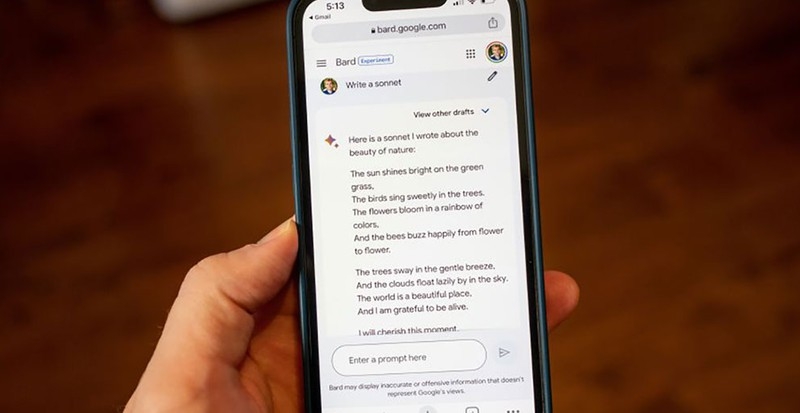Google Bard is the new chatbot designed to compete with ChatGPT. While similar in nature, they have significant differences. Google Bard’s most notable benefit is its ability to understand up-to-date information. However, Bard lacks ChatGPT’s sense of humor and personality, remaining serious and level-headed in all responses. It is also still in its infancy and can be easily confused, although it has restrictions on certain topics that are hateful, violent, or discriminatory. As more people use the chatbot, it will develop a better understanding of what is appropriate and safe to say. In comparison, ChatGPT has improved its understanding of humor, and Bing’s GPT-4 does not share ChatGPT’s weakness of lacking knowledge beyond 2021.
Google Bard: The Competitor of ChatGPT
Google has entered the race to create the ultimate chatbot with its own version known as Google Bard, which rivals ChatGPT. ChatGPT, created by OpenAI, has been a dominant force in the world of chatbots since its inception. However, Google Bard is now competing to take over the chatbot throne.
What is Google Bard, and how does it work? Google Bard is the latest chatbot that users can sign up for via a waitlist. It operates in a manner that is similar to ChatGPT, where you type any worded command into a text box, and Bard will provide an answer. Users can write a poem about dinosaurs, ask for book title ideas, write the code for a website, translate a poem into Arabic, or ask it to solve a complicated mathematical puzzle. While it can sometimes get confused or tell you that it can’t solve a problem, for the most part, Bard is quite capable.
But how does Google Bard differ from ChatGPT, and how does it work? According to Google Bard itself, the training process is a multi-step process consisting of four stages. Firstly, data is collected and prepared, which includes data from sources such as Wikipedia, GitHub, and other publicly available datasets. However, Google also incorporates information from third-party companies and internal data from Google itself. The collected data is then cleaned and prepared for the training process.
Next, the information is fed into a neural network that learns to generate text, translate languages, and create different forms of creative content. The network answers questions in an informative manner, making it an excellent tool for generating content. Once the model is trained, it is tested by comparing its output to human-generated text, translations, and creative content. This testing process helps identify areas where the model needs improvement.
Based on the results of the test, the model can be refined. This can be achieved by adding more data to the training set, changing the model’s architecture, or using different training algorithms. Google Bard and ChatGPT both use similar methods for their training processes, making them equally capable chatbots.
Google Bard is available for users through a waitlist, and for now, it remains free to use once you gain access. The chatbot is a fascinating development in the world of artificial intelligence, demonstrating how technology is changing our world. Although Google Bard and ChatGPT are currently the dominant chatbots on the market, it remains to be seen what the future holds for these technologies.
Is Google Bard a Worthy Competitor to ChatGPT?
Google Bard has emerged as a competitor to ChatGPT, and while they share many similarities, there are also significant differences between the two AI chatbots.
One of Google Bard’s most notable benefits is its ability to understand up-to-date information. For example, it can tell you who the current UK prime minister is, while ChatGPT cannot. Google Bard can also provide summaries of pros and cons of restaurants in nearby areas, recommend places to live based on housing prices in 2023, list the dates of UK festivals in 2023, and summarize major science events taking place this year. However, ChatGPT’s lack of knowledge beyond 2021 is a weakness that Bing’s GPT-4 does not share.
Google Bard’s understanding of regional and recent topics appears to be stronger than ChatGPT’s, while ChatGPT demonstrates a more robust understanding of logic, writing style, and complex problems.
Although Google Bard is impressive in its understanding of recent and niche information, it is still in its infancy and can be easily confused. Simple prompts can sometimes result in confusing responses. For example, when asked to provide 10 food puns about famous literary titles, it gave ten answers, but only one of them was a pun. When asked to write a poem without the letter ‘b’, Bard returned a poem that included that letter.
In conclusion, while Google Bard has impressive abilities, it is not without its flaws. The chatbot is still in its learning phase, and as Google continues to develop it and learn from user interactions, it could improve its performance in the future.
The Serious Side of Google Bard: A Chatbot Without Personality?
Google Bard, Google’s new chatbot, is unlike its competitor ChatGPT in that it lacks personality. While ChatGPT has been known to crack jokes and impersonate celebrities, Bard remains serious and level-headed.
Attempts to prompt Bard to write stand-up comedy routines or sketches result in serious responses, with no jokes or humor included. While this could be a strategy to avoid exposing biases and stereotypes, even the most mundane prompts fail to elicit any laughter. For example, asking Bard to create jokes or comedy sketches about kitchens resulted in a script about a loving couple complimenting each other’s cooking.
Despite its serious nature, Bard can occasionally slip up and display a dark side. While it has restrictions on topics that are hateful, violent, or discriminatory, some jokes that could be seen as inappropriate have still made it through the chatbot’s moderation process.
As more people use Bard, the chatbot will likely develop a better understanding of what is appropriate and safe to say. However, it remains to be seen if Google will follow ChatGPT’s lead in improving its understanding of humor or maintain Bard’s more serious tone.
Don’t miss interesting posts on Famousbio









